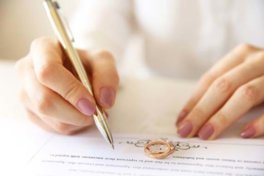There are No Automatic Rights
The first myth we’re going to discuss is the idea that cohabitation means a partner is owed something if the other partner passes away or if the couple separate. In reality, English family law does not recognise cohabitation as a separate legal relationship, so there’s no automatic entitlement to property or finances if you split up. Because there is no legal recognition of “cohabitation” this means that rights and entitlement around finances and property have to be dealt within line with the laws and regulations around those specific areas of law .For example, when purchasing a property together with your partner, you will likely have to decide what will happen with the property if you and your partner split up, or if one of you dies.
in addition, when it comes to the tricky subject of death, there’s also no automatic entitlement to your partner's estate in the event of death, even if you have children with your deceased partner, unless the deceased had made a Will.
In these ways, cohabitation is very different from marriage, which has stricter boundaries in terms of your inheritance.

Without a Will, You May Still be Entitled to Money
If your partner suddenly passes away, the last thing you want to worry about is money, but as we’ve said, there’s a chance you won’t be entitled to what they leave behind if no Will has been drawn up.
However, there are exceptions where you may still be entitled to financial redress. If you can prove that during the relationship you were financially dependent on your deceased partner, then under the Provision for Family and Dependants Act 1975, you may have grounds for a claim.
If you’re in this unfortunate position, our friendly and approachable team are able to provide legal advice when it comes to making a claim under this act. We can support you and fight your corner along the way, helping you put together any information and evidence you will need to make a claim. These are difficult circumstances, but we’re here to try and help take a little weight off your shoulders, making the legal side of things far less stressful.
A Court Order May be Needed to Sell a Property
If you’re a joint owner of a property with your partner, but they’re reluctant to sell it, you may need to obtain a Court Order to facilitate this.
Whatever side of this issue you may find yourself on – whether you’re the ex-partner wanting to sell, or if you’re the ex-partner who doesn’t – we can help you try and get the right result you need.
We will aim to provide unbiased, non-judgmental advice by listening to your story and your experience. This way, we will be able to better understand your priorities and reasons for your stance regarding he property. From this stage, we will then tailor our legal advice to your personal situation.
So, if you’re a joint owner of a property with your partner or ex-partner and one of you wants to sell it, we can provide legal advice on this matter, whatever side of the issue you may be on. We’ll help you come to the right decision and, if needed, we’ll help you obtain a Court Order too.
Your Partner Can Access Joint Bank Accounts if You Split Up
If you have a joint bank account, you both have full access to it, even if only one person pays into it. So if you split up, you can both still legally access the funds in the account.
Therefore, if you’re the sole person depositing money into a joint account and you separate from your partner, it’s a good idea to close or freeze the account as soon as possible.
This ensures that any of your money that is in the account isn’t used by your now ex-partner. The last thing you want, especially after a messy breakup, is to have your ex-partner taking money from you. That’s why, if you’ve been cohabiting and sharing a joint bank account, make sure you take out the money that is yours.
It can be tough, having to talk to your ex – especially about money – but it’s important to figure out who the money in the joint account belongs to, as this will save lots of hassle down the line.
You’re Only Liable for Debts in Your Own Name
You’re only liable for debts in your own name, and not debts solely in your partner's name. You might, however, be responsible for debts which are in joint names. So if a debt is in joint names a creditor whose is owed money from by one party, they may pursue the other party for their respective share of the debt.
In England and Wales for example, if you agreed to act as a guarantor for your partner, and they amass debt which they can’t pay, you will be held legally responsible for paying it.
Debt can be a tricky issue, and one that should be talked about more, especially between cohabiting couples. It’s so important that you’re open and honest with each other about any debts you may have, because if they’re in joint names, they can affect you as well as your partner. An open and honest dialogue around finances and debt is important, for this exact reason.
No Automatic Parental Responsibility
If you move in with your partner and they have their own children from a previous relationship, you won’t automatically be granted Parental Responsibility or be named as their guardian.
Many families these days are made up of step-fathers, step-mothers and step-parents, often where the step-parent and the parent are cohabiting. In these situations, if you’re about to start living long-term – also known as cohabiting – with a partner and they have a child, it’s important to know what your responsibilities are.
The main thing is, you don’t have any automatic responsibilities for your step children. This is another myth that’s somehow circulated, and it just doesn’t reflect the reality of how the law is set up when it comes to cohabitation.
This is another reason as to why it’s so important to understand the law when it comes to cohabiting. There are so many myths and rumours about cohabitation, but many of them simply aren’t true.
Get in Touch
If you'd like to know more about what it means legally to live with your partner, then get in touch with one of our Family Law Solicitors. We can advise on all the legal implications of cohabiting and help you draw up a Cohabitation Agreement, so you can formalise various aspects of your relationship to give you greater legal protection.
Cohabitation Agreements are legally binding in England and Wales, providing that the agreement is written correctly.
We can help you understand the law around cohabitation, so you can fully understand your rights and responsibilities when it comes to this complex area of the law.
This side of things doesn’t have to be stressful or confusing. We’re here to pull back the curtain and help it all feel a little simpler and easier to understand. Especially in matters like cohabitation and finances – which can of course be sensitive topics – you don’t want the stress around the legal side of things looming in your head. That’s why, at Simpson Millar, we can expertly assess your case and offer friendly and approachable legal advice about cohabitation and Cohabitation Agreements.











